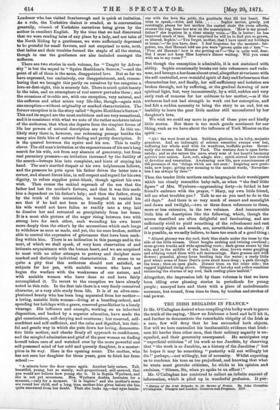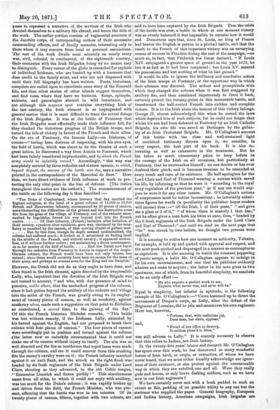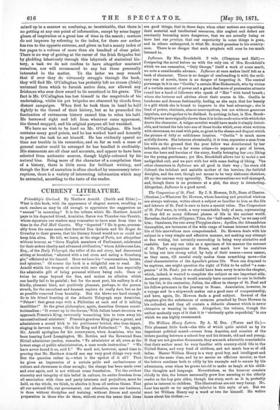THE IRISH BRIGADES IN FRANCE.* IF Mr. O'Callaghan desired when
compiling this bulky work to prove the truth of the saying, Show an Irishman a head and he'll hit it, and further to demonstrate the remarkable ubiquity of the Irish as a race, few will deny that he has succeeded both objects. Nor will we here contradict his inexhaustible evidence that Irish- men hit harder than other men, that their military sagacity is un- equalled, and their generosity unsurpassed. He anticipates any " superficial criticism " of his work as too Jacobite, by observing that " the work is so Jacobite, as a history of the Jacobites ;" but. he hopes it may be something " posterity will not willingly let. die !" perhaps,—not willingly, but of necessity. Whilst expecting us to condemn his tone as too prejudiced, and knowing that what he wrote must provoke criticism, he sticks to his opinion and exclaims, " Silence, Sir, when ye spake to an officer I " Mr. O'Callaghan has contrived to collect an infinite amount of information, which is piled up in wonderful profusion. It pur-
• History of the Irish Brigades in the Service of Prance. By John Cornelius O'Callaghan. Glasgow and London: Cameron and Ferguson. 1670.
poses to represent a narrative of the services of the Irish who devoted themselves to a military life abroad, and hence the title of the work. The earlier portion consists of regimental accounts of the Jacobite corps, of corresponding notices of their successive commanding officers, and of family memoirs, interesting only to those whom it may concern from local or personal associations. The rest of the work dwells most minutely on nearly every war, civil, colonial, or continental, of the eighteenth century, their connexion with the Irish Brigades being by no means easy to distinguish. Every corner of the globe is ransacked for exploits of individual Irishmen, who are hunted up with a keenness that does credit to the family scent, and who are not dispensed with until their full biography has been written. Poets, historians,
compilers are called upon to contribute some story of the Emerald Isle, and then other stories of other islands suggest themselves, and find room where they have no business. Songs, epitaphs, extracts, and genealogies abound in wild luxuriance, and yet although this magnum opus contains everything Irish of the last century, the Irish element is so impregnated with
general matter that it is most difficult to trace the actual doings of the Irish Brigades. It was at the battle of Fontenoy that the Irish Brigades most effectually made their influence felt, for they checked the victorious progress of the British troops, and turned the tide of victory in favour of the French and their allies.
On the eve of Fontenoy, the famous Lally—an Irishman, of course—" having been desirous of inspecting, with his own eyes, the field of battle, which was about to be the theatre of such a great action, he discovered a way from Autoin to Fontenoi, which
had been falsely considered impracticable, and by which the French army would be infallibly turned." Accordingly, " this way was completely secured by three redoubts and sixteen cannon, to which, beyond dispute, the success of the battle was due, says a narrative printed in the correspondence of the Mardchal de Saxe." Here
then, we have direct evidence of Irish influence at work in pro- tecting the only vital point in the line of defence. [The italics throughout this notice are the author's.] The commencement of the battle on the following day is thus described :-
"The Duke of Cumberland, whose bravery that day merited the highest eulogium, at the head of a great column of 14,000 or 15,000 British and Hanoverian infantry, accompanied by 20 pieces of cannon, 'notwithstanding the difficulties of the ground and the destructive cross fire from the guns of the village of Fontenoy, and of the redoubt unas- saulted by Ingoldsby, forced his way beyond both, into the French
centre Of their infantry, (French) battalion after battalion, of their cavalry, squadron after squadron, gave way, shattered by the mus- ketry or smashed by the cannon, of that moving citadel of gallant men.
But, by this time, though its depth seemed undiminished, the column had suffered much ; it looked as if astonished at finding itself in the middle of the French, and without cavalry; it appeared motion- less, as if without further orders ; yet maintaining a fierce countenance, as so far master of the field of battle Had the Dutch now burst through the redoubts from Fontenoy to Autoin in support of the Anglo- German column, the French would have been not only beaten, but ruined ; since there would certainly have been no escape for the mass of their army, and perhaps no retreat even for the King and the Dauphin."
However, the Dutch did not do as they ought to have done, and then timed in the Irish element, again directed by the irrepressible Lally, who, impatient that the devotion of the Irish Brigade was cot turned to account, "and who, with due presence of mind to perceive, unlike others, that the unchecked progress of the column, since it had gotten beyond the artillery of the redoubt and village into the midst of the French, was greatly owing to its employ- ment of twenty pieces of cannon, as well as musketry, against musketry alone, made such a suggestion on that point to Richelieu as contributed, a second time, to the gaining of the day." Of this the French historian Michelet remarks, " This battle was lost without remedy, if the Irishman Lally, animated by his hatred against the English, had not proposed to break their column with four pieces of cannon." The four pieces of cannon were accordingly put in position and tamed against the column (the latter now so unluckily circumstanced that it could not make use of its cannon without injury to itself). The aim was so well directed and the fire so murderous that rapid lanes were made through the column, and ere it could recover from this crushing fire the enemy's cavalry were on it ; the French infantry marched against it on each flank, and the attack on the right flank was headed by six fresh regiments of the Irish Brigade under Lord Clare, shouting as they advanced, in the old Celtic tongue, ." Remember Limerick and Saxon perfidy !" This simultaneous onset from all sides, to which it could not reply with artillery, was too much for the Duke's column ; it was rapidly broken up and driven from the field, the French Minister, who was pre- sent, affirming that the battle was won in ten minutes. Of its twenty pieces of cannon, fifteen, together with two colours, are
said to have been captured by the Irish Brigade. Thus the crisis of the battle was over, a battle in which at one moment victory was so evenly balanced it was impossible to surmise how it would end. Dumortous says that, since St. Louis, no king of France had beaten the English in person in a pitched battle, and that the result to the French of this important victory was an unvarying course of success in Flanders during the rest of the campaign,—so much so, in fact, that Frederick the Great declared, " If Louis XIV. subjugated a greater space of ground in the year 1672, he lost it as fast as it had been conquered ; but Louis XV. secured his possessions and lost nothing of what he had gained."
It would be idle to ignore the brilliancy and conclusive action of the Irish troops at Fontenoy, or the opportune way in which their advance was directed. The ardour and promptitude with which they charged the column when it was first staggered by artillery fire, and then continued impetuously to force it back, certainly proved the turning-point in this memorable battle, and transformed the half-routed French into sudden and complete victors. It is to the Irish alone the honour of this victory belongs. George II. almost acknowledged this when he cursed the laws which deprived him of such subjects, for he could not forget that whilst his son had been defeated at Fontenoy by an Irish Catholic Brigade, his own life was saved at Dettingen by the gallan- try of an Irish Protestant Brigade. Mr. O'Callaghan's account of this battle with the close and well-sustained light of combined testimony thrown upon it, we consider, in every respect, the best part of his book. It is also in- teresting as well as exhaustive in the treatment. But he has taken so much unnecessary pains to keep before us the courage of the Irish on all occasions, but particularly at Fontenoy, that he overreaches himself ; no one doubts or has ever doubted their pluck, and it becomes tiresome to be reminded at every touch and turn of its existence. He half apologizes for the Lord Clare and Earl of Thomond wearing a cuirass which saved his life, by informing us that he wore it "according to the royal army regulation of the previous year," as if any one would sup- pose he wore it for any other reason. Mr. O'Callaghan's notions of compression must be rather inconsistent ; he invariably substi- tutes figures for words (a peculiarity the publisher hopes readers will excuse) thus :—" Of the Irish, 1 of their poets," " and gave me a glass or 2 of it," " of whom there is scarcely 1 that has ;" yet he often gives a man both his titles at once, thus, " headed by the 6 fresh regiments of the Irish Brigade under the Lord Clare and Earl of Thomond ;" and until we read on the next page that "he" was struck by two bullets, we thought two persons were implied.
It is amusing to notice how one moment an authority, Voltaire, for example, is held up and quoted with approval and respect, and the next pooh-poohed and disparaged in a manner as contemptuous as capricious. It is also amusing to watch the constant peppering of poetic scraps, a habit Mr. O'Callaghan appears to indulge in for his own entertainment, and one that his publisher evidently admires and seeks to acquire ; the latter in his note gives us two specimens, one of which, from its beautiful simplicity, we conclude to be an early effort :-
" He who expects a perfect work to see, Expects what never was, and ne'er will be."
Equal in simplicity, but inferior in aptitude, is the following example of Mr. O'Callaghan's :—" Coote hastened up to direct the movements of Draper's corps, as Lally, after the defeat of the Regiment of Lorraine, did to join and manceuvre his own regiment. Here too, however,
" Fortune, that, with malicious joy, Does man, her slave, oppress,"
" Proud of her office to destroy, Is seldom planed to bless,"
was still adverse to Lally." It is scarcely necessary to observe that this refers to Indian, not Irish history.
In the twenty-five years' labour and research Mr. O'Callaghan has spent over this work, he has discovered so many wonderful heroes of Irish birth, or origin, or extraction, of whom we have never heard, that we must either humbly acknowledge our ignor- ance of their existence, or else protest against the unreasonable way in which they are extolled, one and all. Were they really gods and heroes, or only brave dashing soldiers, such as we have now in our Irish regiments ?
We have certainly never met with a book padded to such an extent as this, padding of no possible utility to any one but the stationer who supplied the paper. General biography, European and Indian history, American campaigns, Irish brigades are and, mixed up in a manner so confusing, so inextricable, that there is no getting at any one point of information, except by some happy gleam of inspiration or a great loss of time in the search ; matters do not improve by referring to the index, for there our author has run to the opposite extreme, and given us but a scanty index of ten pages to a volume of more than six hundred of close print. There is no way of getting at the career of the Irish Brigades but by plodding laboriously through this labyrinth of statistical his- tory, a task we do not confess to have altogether mastered ourselves, nor will recommend to any but those personally interested in the matter. To the latter we may remark that if ever they do virtuously struggle through the book, they will find Mr. O'Callaghan has probably left no stones (Irish) unturned from which to furnish native data, nor allowed any Irishman who ever drew sword to lie unnoticed in his grave. The fact is Mr. O'Callaghan has lost himself in the magnitude of his undertaking, whilst his pet brigades are obscured by clouds from distant campaigns. When first he took them in hand he held tightly to the thread of their history, but as he proceeded the fascination of extraneous history caused him to relax his hold. He borrowed right and left from whatever came uppermost, the thread snapped, and his original purpose all but vanished.
We have no wish to be hard on Mr. O'Callaghan. His book contains many good points, and he has worked hard and honestly to perfect the task he set himself. He has evidently spared no time nor trouble in his researches, and so far as such a mass of general matter could be arranged he has handled it creditably. His statements are all clear and accurate, and appear to have been selected from authentic sources, though highly-coloured by his natural bias. Being more of the character of a compilation than of a history, there is little room for brilliant writing, and though the flow of narration is often checked by unnecessary inter- ruptions, there is a variety of interesting information which may be extracted, according to the taste of the reader.




































 Previous page
Previous page